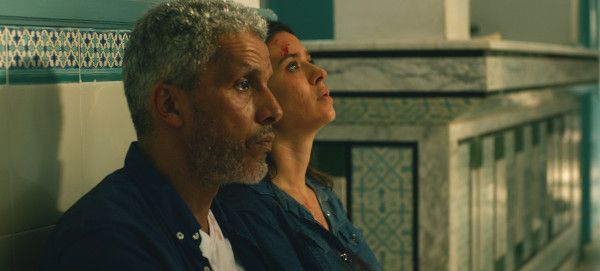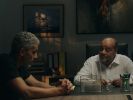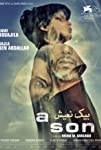Eye For Film >> Movies >> A Son (2019) Film Review
A Son
Reviewed by: Amber Wilkinson

Editor's note: I've done my best to avoid spoilers in the following review, but I have had to allude to second-act events in order for it to make any sense. Proceed at your own risk
Tangled family affairs become increasingly politically and morally loaded as this assured and gripping debut feature from Mehdi Barsaoui progresses. It is the law of movies that when a family are enjoying themselves in a car, it is almost always heralds disaster - and that holds true here, as a moment of joyful singing along to Gregorius by Si Lemhaf by middle-class couple Fares (Sami Bouajila) and Meriem (Najla Ben Abdallah) and their 11-year-old son Aziz (Youssef Khemiri) is shattered by a bullet. There are similarities to Asghar Farhadi in the subtle way Barsaoui explores the emotional fallout in the family as a bloodied trip to the emergency rooms ends with Aziz in intensive care requiring a liver transplant and a family secret being revealed but he has his own distinctive voice.

To say too much more about the plot would be to spoil what is both a sharply observed drama with a tightly worked thriller element, as we learn that organ transplantation in Tunisia is easier said than achieved and heavily reliant on immediate family members. Fares finds himself faced with the choice of paying for the privilege of his son's survival on the black market. The implication is that, in the wake of the 2011 Tunisian revolution, Aziz can be a beneficiary of the neighbouring war in Libya, although the truth will turn out to be considerably darker than that - although it is another of element of the film where Barsaoui opts for subtle horror over melodramatics. He also lets small details speak volumes, from children's legs in a dorm room to the way one child glugs down a cup of water as though it's the first he has drunk in a week.
There is a lot going on here on both a family and a political level, but Barsaoui sensibly avoids spelling things out letter by letter. Where other directors might have zoomed in on the conflict that springs up between Fares and Meriem, he takes a different route. First, he allows the tension build to almost unbearable levels as we watch the couple's intimacy, knowing it is about to be shattered, and then he allows the revelations to play out behind a closed door, bathing us, instead, in its aftermath as Meriem stews in stress and Fares becomes increasingly unpredictable.
Barsaoui and his cinematographer Antoine Héberlé use the space between the couple to great effect, so that they are shot at close quarters repeatedly in the opening half hour of the film and, as their relationship begins to crack open, they become more isolated in the frame, at opposite sides of the hospital waiting room. Sound design is also used sparingly but to good effect, with flies, for example, buzzing menacingly in one desert shot. Politics and patriarchy are held up to scrutiny but Barsaoui makes the film resonate by keeping the focus on the couple's shared love of their son and the implications this has that go beyond a simple husband and wife dynamic.
Reviewed on: 31 Mar 2020















